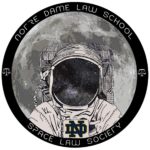 The Notre Dame Space Law Society is a student organization that aims to provide events and programs for law students interested in space law, and/or who are planning to pursue a career in space law or policy. These activities and programs include moot court teams; networking events; and speakers and discussions on issues involving the field of space law, career options, and the relationships between law, policy, ethics, science, and space.
The Notre Dame Space Law Society is a student organization that aims to provide events and programs for law students interested in space law, and/or who are planning to pursue a career in space law or policy. These activities and programs include moot court teams; networking events; and speakers and discussions on issues involving the field of space law, career options, and the relationships between law, policy, ethics, science, and space.
What is Space Law?
Space law involves the study and practice of law in areas that facilitate space exploration, space commercialization, and space related research. These areas include government contract law, regulatory law, military law, aviation law, telecommunications law, outer-space law, and more.
At the international level, space law can be thought of as a sub-specialty or field within international law. International space law addresses a variety of matters, such as, for example, the preservation of the space and Earth environment, liability for damages caused by space objects, the settlement of disputes, the rescue of astronauts, the sharing of information about potential dangers in outer space, the use of space-related technologies, and international cooperation. A number of fundamental principles guide the conduct of space activities, including the notion of space as the province of all humankind, the freedom of exploration and use of outer space by all states without discrimination, and the principle of non-appropriation of outer space. Click here for the international treaties and principles as well as here for an article summarizing them.
Domestic national space law in the United States, consists of statutes passed by Congress, as well as regulations promulgated by the FAA, FCC, and the Commerce Department. These laws often directly regulate the abilities and actions of commercial space companies. At the domestic level, many other fields of law influence or mesh with space law, including property, torts, contracts, administrative law, insurance, international trade/export control, environmental, intellectual property, etc. See this article for an overview of domestic space law.
Some states also have “space law” that establishes state space agencies which manage spaceports and promote space commerce within the state. These states also often have laws limiting the liability of space companies.
Additionally, there are many areas of law that affect space companies and space issues, including business law, products liability, and labor and employment, creating a host of opportunities for lawyers who are interested in using their litigation skills in the space industry.
Why is space law important right now?
Space law is critical to a number of current topics and issues both globally and domestically including: national security and telecommunications. Space law is a vital element of military satellite launches, which require the work of lawyers who practice in regulatory, and government contract law. Additionally, space law is an important part of the telecommunications industry, which requires the work of both telecommunications and regulatory lawyers to facilitate commercial satellite launches.
What types of jobs are there in space law?
There are a large number of legal jobs in the field the growing field of space law. Federal agencies including the Federal Aviation Administration (“FAA”), Federal Communications Commission (“FCC”), and the National Aeronautics and Space Administration (“NASA”) all have lawyers dedicated to areas of practice that exist under the umbrella of space law. Additionally, the United States Air Force and the Department of Defense also have lawyers who specialize in space law. On the private side many large law firms have practice groups solely devoted to air & space law, government contract law, and telecommunications law.